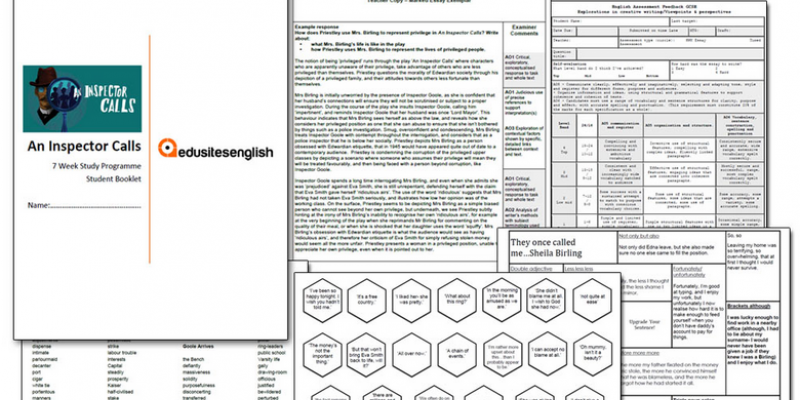

"Edusites English has been a game-changer for my classroom, providing expertly crafted resources that make teaching complex texts straightforward and enjoyable." "The revision guides and practice papers have given my students the confidence they need to excel in their exams, with noticeable improvements in their results." "Edusites English saves me so much time with its comprehensive lesson plans and study guides, allowing me to focus on what matters most—teaching and supporting my students." "The diverse range of materials, from text analysis to creative writing resources, keeps my students engaged and inspired in their English studies."
Drawing room drama, murder mystery, critique of the classes, socialist sales pitch- there are a lot of different phrases you could use when describing ‘An Inspector Calls’. It’s a popular, short, and compelling little play that has been on the GCSE specification for decades now.
As a text, An Inspector Calls has all of the components you want for a piece of literary analysis. It’s short, and therefore allows you to really study the events and language in detail. The premise is easy to grasp, and is a perfect vehicle for bigger ideas. There is historical context aplenty. Priestley was writing at a time of huge social change, and the arguments being had around the dinner table in 1912, 1945, and 2018 haven’t changed all that much. The play feels as relevant and as powerful now, as when it was first performed.

This is a 'swiss army knife' of a scheme of work. You can use it as it is laid out below - a teaching booklet with all your photocopying done for the term in one go. Students can complete this work independent of a subject specialist- if you are unfortunately without a specialist English teacher, then all of the ‘direct instruction’ is in the booklet.
You can also use it purely for the teacher as a SOW guide, and display the instructions to the students or verbally deliver them. It takes you through the entire text, and then revisits key scenes for more in depth analysis.
Alternatively, you could use this as a homework guide, where students read in class and then return to the key scenes and topics at home for homework. Or, for year eleven students who have already studied the text, and are now returning to it in preparation for their June exam.

Register now for our subject updates and FREE instant access to this article.
Already registered? Login below to continue reading this article.
